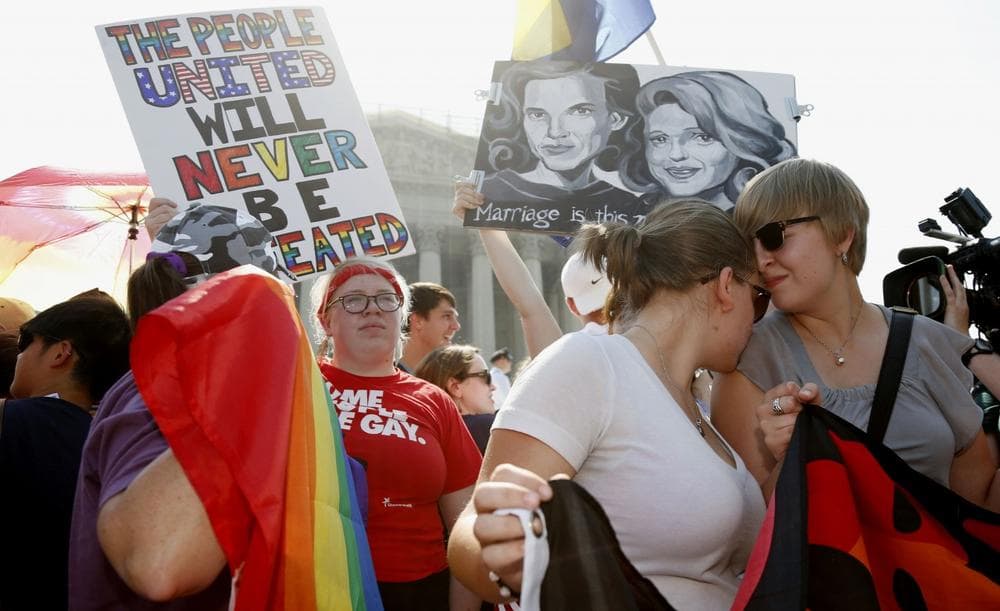Advertisement
Supreme Court Strikes Down DOMA Provision

Two rulings on Wednesday from the Supreme Court will be celebrated by supporters of gay marriage.
First, the court struck down a provision of the federal Defense of Marriage Act (DOMA), and ruled that legally-married same-sex couples should get the same federal benefits as heterosexual couples.

This means couples who got married in and live in states that recognize same-sex marriage will be eligible for benefits including social security, joint tax filing and certain tax deductions and credits.
"Whether states recognize each other's marriages is for another day," legal expert Emily Bazelon told Here & Now.
Inside the DOMA ruling
In the majority opinion, Justice Anthony Kennedy wrote, "Under DOMA, same-sex married couples have their lives burdened, by reason of government decree, in visible and public ways."
He was joined by the court's four liberal justices.
Chief Justice John Roberts and Justices Samuel Alito, Antonin Scalia and Clarence Thomas dissented.
Scalia's dissent was less about defending "traditional marriage," and more about the limits of judicial power.
"It's all about the idea of the court taking too much power upon itself to decide this case," Bazelon said. "It’s not really, at least in its main thrust, about Scalia’s moral disapproval of gay people."
Bazelon says same-sex couples in states that recognize same-sex marriage will begin receiving federal benefits very soon.
Proposition 8
The court also cleared the way for same-sex marriage in California. The justices ruled that opponents of gay marriage didn't have the right to appeal lower court rulings that struck down a ban on same-sex unions.
"It’s not the question of whether California should or shouldn’t have gay marriage, or whether there’s a constitutional right to gay marriage," Bazelon explained.
The Court dismissed the case, saying that the defenders of the marriage ban who brought suit had no standing.
The court's 5-4 vote Wednesday leaves in place the initial trial court declaration that the ban is unconstitutional.
Bazelon said that because this is now contingent on the district court's ruling--which is sort of a provincial court, not a state-wide court, it is still up to the governor and the executive branch in California to "interpret the ruling and apply it state-wide. But the Supreme Court did not directly order that today."
Advertisement
Reaction from both sides
For Ricardo Moreno, who was unable to legally marry his partner Arturo Avena because of Proposition 8, both rulings come as a great relief. Having their relationship recognized by the state will allow them to access the rights and privileges married couples take for granted, he said.
"We had to go through the very lengthy process of becoming domestic partners and then having to wait a few days for a decision whether, basically, our relationship was validated," Moreno said. “It’s nice to finally just say, 'We’re married and here you go.'”
Opponents of same-sex marriage take some comfort in the Court's narrow ruling on Proposition 8.
"Prop 8 was not overturned. It was not determined to be unconstitutional," said Chris Plante, a regional director of the National Organization for Marriage. "At its most basic, it only applies to the two couples that were in district court."
The Associated Press contributed reporting to this article.
Guest:
- Emily Bazelon, senior editor for Slate magazine and senior research fellow at Yale Law School. She tweets @emilybazelon.
- Ricardo Moreno, Los Angeles resident who wasn't able to marry his partner in California due to Proposition 8.
- Chris Plante, a regional director for the National Organization for Marriage.
This segment aired on June 26, 2013.